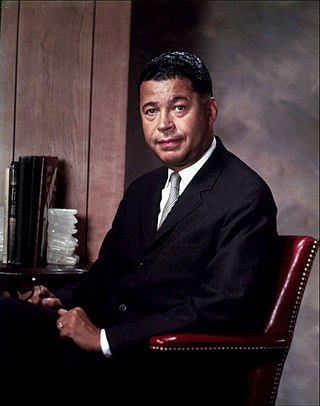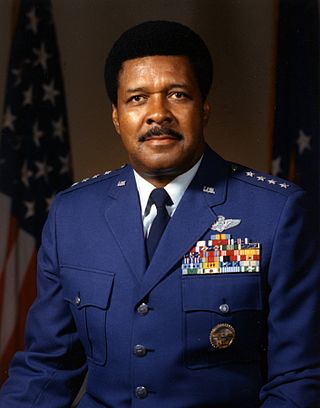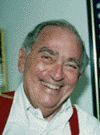Related Research Articles

Barry Morris Goldwater was an American politician and major general who served as a United States senator from 1953 to 1965 and 1969 to 1987, and was the Republican Party's candidate for president in 1964.

The 1968 United States presidential election was the 46th quadrennial presidential election, held on Tuesday, November 5, 1968. The Republican nominee, former vice president Richard Nixon, defeated both the Democratic nominee, incumbent vice president Hubert Humphrey, and the American Independent Party nominee, former Alabama governor George Wallace.
This section of the Timeline of United States history concerns events from 1950 to 1969.

Edward William Brooke III was an American lawyer and politician who represented Massachusetts in the United States Senate from 1967 to 1979. A member of the Republican Party, he was the first African American elected to the United States Senate by popular vote. Prior to serving in the Senate, he served as the Attorney General of the Commonwealth of Massachusetts from 1963 until 1967.

The American Whig–Cliosophic Society (Whig-Clio) is a political, literary, and debating society at Princeton University and the oldest debate union in the United States. Its precursors, the American Whig Society and the Cliosophic Society, were founded at Princeton in 1769 and 1765 by James Madison, William Paterson, Oliver Ellsworth, and Aaron Burr.

Young Americans for Freedom (YAF) is a conservative youth activism organization that was founded in 1960 as a coalition between traditional conservatives and libertarians on American college campuses. It is a 501(c)(3) nonprofit organization and the chapter affiliate of Young America's Foundation. The purposes of YAF are to advocate public policies consistent with the Sharon Statement, which was adopted by young conservatives at a meeting at the home of William F. Buckley in Sharon, Connecticut, on September 11, 1960.

John Wesley Dean III is an American attorney who served as White House Counsel for U.S. President Richard Nixon from July 1970 until April 1973. Dean is known for his role in the cover-up of the Watergate scandal and his subsequent testimony to Congress as a witness. His guilty plea to a single felony in exchange for becoming a key witness for the prosecution ultimately resulted in a reduced sentence, which he served at Fort Holabird outside Baltimore, Maryland. After his plea, he was disbarred.

Harry Flood Byrd Jr. was an American orchardist, newspaper publisher and politician. He served in the Senate of Virginia and then represented Virginia in the United States Senate, succeeding his father, Harry F. Byrd Sr. His public service spanned thirty-six years, while he was a publisher of several Virginia newspapers. After the decline of the Byrd Organization due to its massive resistance to racial integration of public schools, he abandoned the Democratic Party in 1970, citing concern about its leftward tilt. He rehabilitated his political career, becoming the first independent in the history of the U.S. Senate to be elected by a majority of the popular vote.

Daniel "Chappie" James Jr. was a fighter pilot in the United States Air Force who, in 1975, became the first African American to reach the rank of four-star general in the United States Armed Forces. Three years later, James was forced to retire prematurely due to heart issues, just weeks before he died of a heart attack.

William Allen Rusher was an American lawyer, author, activist, and conservative columnist. He was one of the founders of the conservative movement and was one of its most prominent spokesmen for thirty years as publisher of National Review magazine, which was edited by William F. Buckley Jr. Historian Geoffrey Kabaservice argues that, "in many ways it was Rusher, not Buckley, who was the founding father of the conservative movement as it currently exists. We have Rusher, not Buckley, to thank for the populist, operationally sophisticated, and occasionally extremist elements that characterize the contemporary movement."

Marvin Liebman was an American conservative activist and fundraiser, and later in his life, a gay rights advocate.
Robert Henry Winborne Welch Jr. was an American businessman, political organizer, and conspiracy theorist. He was wealthy following his retirement from the candy business and used his wealth to sponsor anti-communist causes. He co-founded the John Birch Society (JBS), an American extreme right-wing political advocacy group, in 1958 and tightly controlled it until his death. He was highly controversial and criticized by liberals, as well as some mainstream conservatives, including William F. Buckley Jr.

Barry Morris Goldwater Jr. is an American businessman and politician. He is a former Republican member of the United States House of Representatives from California, serving from 1969 to 1983. He is the son of U.S. Senator and 1964 Republican presidential nominee Barry Goldwater.

Fulton Lewis Jr. was a conservative American radio broadcaster from the 1930s to the 1960s.
The 1964 presidential campaign of Barry Goldwater began when United States Senator Barry Goldwater of Arizona elected to seek the Republican Party nomination for President of the United States to challenge incumbent Democratic President Lyndon B. Johnson. Early on, before officially announcing his candidacy for the presidency, Goldwater was accused by Governor of New York Nelson Rockefeller of attempting to galvanize Southern and Western Republican support while neglecting the industrial northern states, eventually becoming one of Goldwater's primary opponents in the race for the Republican Party's nomination in 1964.

The House Committee on Un-American Activities (HCUA), popularly the House Un-American Activities Committee (HUAC), was an investigative committee of the United States House of Representatives, created in 1938 to investigate alleged disloyalty and subversive activities on the part of private citizens, public employees, and those organizations suspected of having either fascist or communist ties. It became a standing (permanent) committee in 1945, and from 1969 onwards it was known as the House Committee on Internal Security. When the House abolished the committee in 1975, its functions were transferred to the House Judiciary Committee.

The Byrd Amendment—named for its author, Senator Harry F. Byrd Jr. of Virginia—was a 1971 amendment to the U.S. Federal Strategic and Critical Materials Stock Piling Act. It prohibited the US government from banning the importation of any strategic material from a non-communist country as long as the importation of the same materials from communist countries was also not prohibited. While it did not single out any particular country, it had the effect–intended by its sponsors–of creating an exception in the United States embargo of Rhodesia to enable the import of chromite ore from that country.
Frederick Clifton White Sr., was an American political consultant and campaign manager for candidates of the Republican Party, the New York Conservative Party, and some foreign clients. He is best remembered as the moving force behind the Draft Goldwater Committee from 1961 to 1964, which secured a majority of delegates to nominate U.S. Senator Barry M. Goldwater of Arizona as the presidential candidate of the Republican Party.
Lewis Winnbert Shollenberger was a correspondent for United Press, CBS, and ABC in Washington, D.C., from 1940 to 1963. He covered the White House and the U.S. Senate as well as coordinated network coverage of presidential news briefings and debates. He went on to work for Radio Liberty, the Small Business Administration, and the Advertising Council.
The 1968 Tallahassee riots were one of many riots that broke out after Martin Luther King was assassinated in Tallahassee, Florida lasting from April 5–7, 1968. It was originally a student protest but later became a riot as a result of the rage and anger of participants. The riot happened at Florida A & M University but unrest would be seen to a lesser extent in the Frenchtown neighborhood.